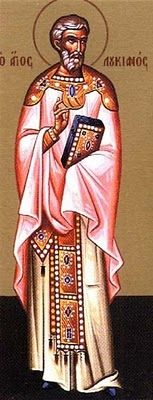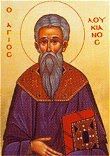Lucian the most wise ascetic and scribe
Boldly walked on the path of Christ.
Against heretics and idolatrous darkness
Lucian the victor waged a bitter struggle.
Planted firmly on the foundation of the Most-holy Trinity -
The Father without beginning, with the Spirit and the Son -
Lucian glorified God in word and deed,
And he confirmed this by his innocent blood.
Savage Rome collapsed, the heresies died;
Works immoral and shameful perished;
The Church raised martyrs up to heaven;
And the Church, great and glorious, outlived all.
This is the Kingdom of saints, the Kingdom without end
That Daniel foretold and Christ founded -
O desired Kingdom, of earthly origin,
With golden domes atop the heavenly roofs!
And holy Lucian, a builder of that Kingdom,
Labored much, and gave all for it.
He now gloriously reigns beside his Jesus,
Borne by God to the angelic flock.
Today, January 7, we celebrate the feast of Saint Lucian of Antioch (also know as Saint Loukianos, died 312), early Martyr of the Church. Saint Eusebius described Saint Lucian as follows: "Among the martyrs at Antioch was Lucian, a presbyter of that parish, whose entire life was most excellent. At Nicodemia, in the presence of the emperor, he proclaimed the heavenly kingdom of Christ, first in an oral defense, and afterwards by deeds as well."
Saint Lucian was born into a wealthy, noble family in Samosata—a city in Syria. Receiving the finest education from birth, Lucian demonstrated great knowledge and academic prowess both in secular and spiritual matters. He spent the majority of his time in study, prayer, and contemplation, embracing both an austere and ascetic lifestyle. Due to his wisdom and piety, he was well respected, and served as a model of faithfulness and charity to those he encountered.
Lucian distributed his wealth, and the wealth of his parents upon their deaths, to the poor, preferring to support himself through hard work and service. He labored over academic instructional manuals and texts, and spent hours translating and correcting Church texts which had been distorted by the Arian heretics. He was appointed a presbyter (leader of the congregation) in Antioch.
During the Christian persecutions of Emperor Maximian, Saint Lucian was among those identified and arrested. He was imprisoned and brutally tortured for his Christian faith, which he, of course, refused to recant. Countless faithful were tortured and killed, including children. Among the martyrs of that time were Saint Pelagia, Saint Victor the Moor, Saint Maurice and the Martyrs of the Theban Legion, and many others.
Lucian was starved in prison for many weeks, but held true to his faith. Saint John Chrysostom wrote of this holy man: "He scorned hunger: let us also scorn luxury and destroy the power of the stomach that we may, when the time that requires such courage comes for us, be prepared in advance by the help of a lesser ascesis, to show ourselves glorious at the time of battle."
Following Holy Communion, Saint Lucian was martyred on the Theophany, run through by a sword. His courage and life devoted to quiet faith-filled pursuits encourage us to proudly wear our faith—despite objections or criticism from others—just as Saint Lucian proudly wears the crown of Martyrdom!
From the Prologue of Ohrid, written by Saint Nicholas Velimirovic:
“The saints of God place great importance on receiving Holy Communion before their death. Even though they were sacrificing their lives for Christ the Lord and washing away all their sins by the blood of martyrdom, the martyrs longingly received the Holy Mysteries whenever it was possible. St. Lucian was in prison with several of his disciples and other Christians. On the eve of Theophany [Epiphany], Lucian longed, on such a great Christian feast, to partake of the Body and Blood of Christ, for he knew that his death was imminent. Seeing the sincere desire of His sufferer, God Almighty arranged that some Christians pass bread and wine into the prison.
When the Feast of Theophany dawned, Lucian called all the Christian prisoners to stand in a circle around him and said to them: “Surround me and be the Church.” He had no table, chair, stone or wood in the prison upon which to celebrate the Divine Liturgy. “Holy Father, where shall we place the bread and wine?” they asked Lucian. He lay down in their midst and said: “Place them on my chest, let it be a living altar for the Living God!” And thus the Liturgy was celebrated correctly and prayerfully on the chest of the martyr, and all received Holy Communion. The next day, the emperor sent soldiers to bring Lucian out for torture. When the soldiers opened the door of the prison, St. Lucian cried out three times: “I am a Christian! I am a Christian! I am a Christian!” and with that, he gave up his soul to his God.”
Gracious God, in every age you have sent men and women who have given their lives in witness to your love and truth. Inspire us with the memory of St. Lucian of Antioch, whose faithfulness led to the way of the cross, and give us courage to bear full witness with our lives to your Son’s victory over sin and death, for he lives and reigns with you and the Holy Spirit, now and forever. Amen.
Year 2: Day 7 of 365
Prayer Intentions: Lives of visible faith in Jesus Christ.
Requested Intentions: Improved financial stability (A); Improved relationship with business partner (A); For employment (N); Reconciliation of a workplace relationship (R); Healing of son, cousin, and friend (L); Healing of a husband from cancer, end to medical problems (T); Freedom from persecution (E); Successful employment (R); Reconciliation of a marriage (M); Successful marriage, employment, healing (J); For a family struggling with a difficult situation (M); For family intentions (I); Reconciliation of a marriage (S); For blessings upon a family (R); Permanent employment (N); Successful employment (M); Healing of a father following stroke (S).
Why pray the Rosary every day for a year?
Each time the Blessed Virgin has appeared-- whether it be to Saint Bernadette Soubirous at Lourdes; to Lucia, Jacinta, and Francisco at Fatima; or to Mariette Beco at Banneux-- she has asserted the importance, saving grace, and power of praying the Holy Rosary on a daily basis. Based upon her words, the Rosary is penance and conversion for sinners, a pathway to peace, an end to war, and a powerful act of faith in Jesus Christ. Pope Paul VI presented the Rosary as a powerful means to reach Christ "not merely with Mary but indeed, insofar as this is possible to us, in the same way as Mary, who is certainly the one who thought about Him more than anyone else has ever done."
To show us how this is done, perhaps no one has been more eloquent than the great Cardinal Newman, who wrote: "The great power of the Rosary consists in the fact that it translates the Creed into Prayer. Of course, the Creed is already in a certain sense a prayer and a great act of homage towards God, but the Rosary brings us to meditate again on the great truth of His life and death, and brings this truth close to our hearts. Even Christians, although they know God, usually fear rather than love Him. The strength of the Rosary lies in the particular manner in which it considers these mysteries, since all our thinking about Christ is intertwined with the thought of His Mother, in the relations between Mother and Son; the Holy Family is presented to us, the home in which God lived His infinite love."
As Mary said at Fatima, "Jesus wants to use you to make Me known and loved. He wishes to establish the devotion to My Immaculate Heart throughout the world. I promise salvation to whoever embraces it; these souls will be dear to God, like flowers put by Me to adorn his throne."

Subscribe to:
Post Comments (Atom)












0 comments:
Post a Comment
Thanks for leaving a comment. If you wish to submit a prayer request, however, please do so above, using the "Contact" tab.